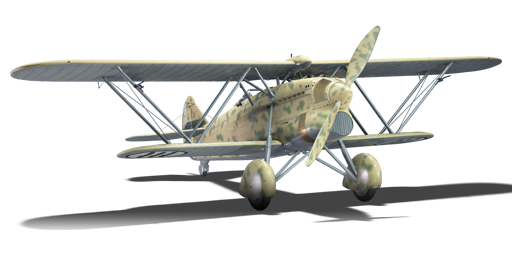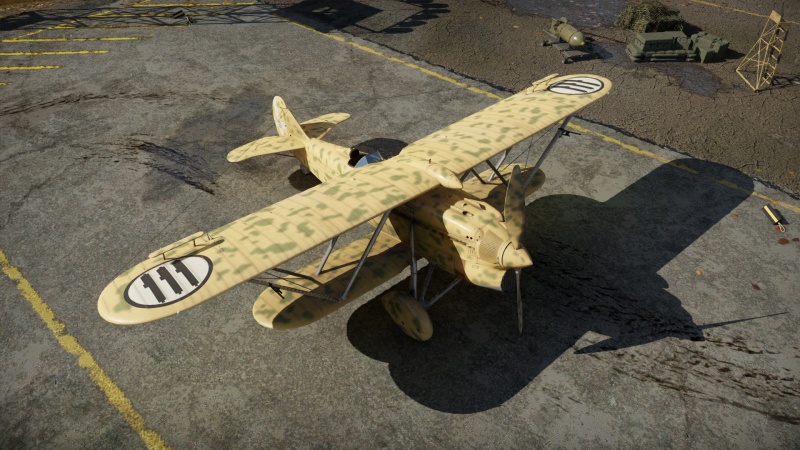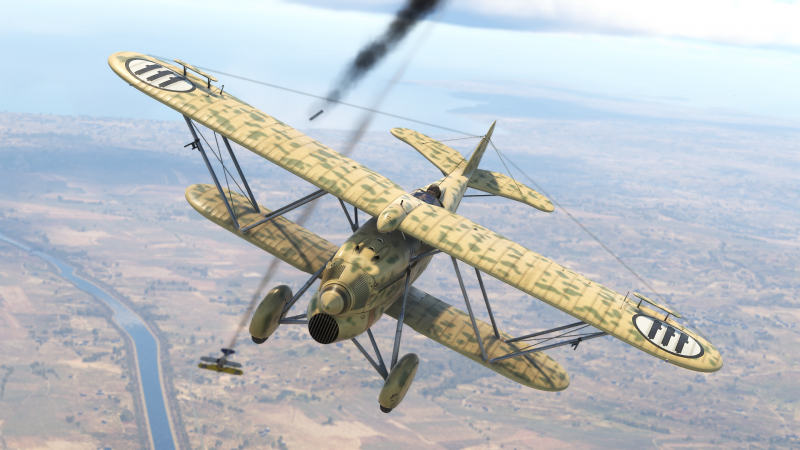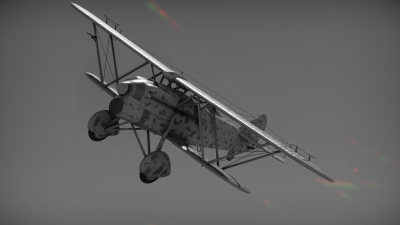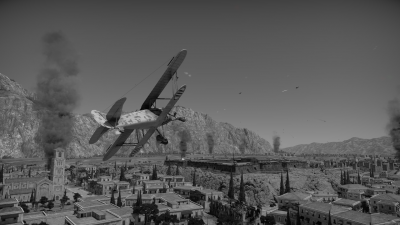Difference between revisions of "CR.32 quater"
(Updated format) |
(→Description) |
||
| (15 intermediate revisions by 7 users not shown) | |||
| Line 1: | Line 1: | ||
{{About | {{About | ||
| about = Italian fighter '''{{PAGENAME}}''' | | about = Italian fighter '''{{PAGENAME}}''' | ||
| − | |||
| usage = other versions | | usage = other versions | ||
| − | | link | + | | link = CR.32 (Family) |
| − | |||
}} | }} | ||
{{Specs-Card | {{Specs-Card | ||
|code=cr_32_quater | |code=cr_32_quater | ||
| − | |images={{Specs-Card-Image|GarageImage_{{PAGENAME}}.jpg}} | + | |images={{Specs-Card-Image|GarageImage_{{PAGENAME}}.jpg|ArtImage_{{PAGENAME}}.png}} |
|cockpit=cockpit_cr_32_quater.jpg | |cockpit=cockpit_cr_32_quater.jpg | ||
}} | }} | ||
| Line 14: | Line 12: | ||
== Description == | == Description == | ||
<!-- ''In the description, the first part should be about the history of and the creation and combat usage of the aircraft, as well as its key features. In the second part, tell the reader about the aircraft in the game. Insert a screenshot of the vehicle, so that if the novice player does not remember the vehicle by name, he will immediately understand what kind of vehicle the article is talking about.'' --> | <!-- ''In the description, the first part should be about the history of and the creation and combat usage of the aircraft, as well as its key features. In the second part, tell the reader about the aircraft in the game. Insert a screenshot of the vehicle, so that if the novice player does not remember the vehicle by name, he will immediately understand what kind of vehicle the article is talking about.'' --> | ||
| − | The | + | The CR.32 quater was the next development of the [[CR.32 (Family)|CR.32 family]], in particular compared to the CR.32 ter, this variant was lightened to increase manoeuvrability at low altitudes. It was the last variant of the CR.32 to be built when production of them ended in 1939, and they began to be replaced by the more powerful [[CR.42 (Family)|CR.42]] from 1940 onwards. When World War II broke out, the CR.32 quater were mostly in the hands of the 1st, 2nd and 6th Stormo, Caccia Terrestre, and a small part of the Gruppi Autonomi, and eventually the 410th and 411th Squadriglia Autonoma Caccia located in East Africa. |
| − | + | Added with the introduction of the Italian air tech tree in [[Update 1.69 "Regia Aeronautica"]], this aircraft is the second reserve of the Italian air tech tree. It is an enhancement of the CR.32 that allows it to be more manoeuvrable, while the armament is the same as the previous one having two very powerful 12.7 mm machine guns; in particular, using the "Air targets" belts that contain many incendiary projectiles can set enemies on fire very easily. | |
| − | |||
| − | |||
| − | |||
| − | |||
== General info == | == General info == | ||
| Line 67: | Line 61: | ||
! Combat !! Take-off !! Landing !! + !! - | ! Combat !! Take-off !! Landing !! + !! - | ||
|- | |- | ||
| − | | {{Specs|destruction|body}} || {{Specs|destruction|gear}} || N/A || N/A || N/A || ~ | + | | {{Specs|destruction|body}} || {{Specs|destruction|gear}} || N/A || N/A || N/A || ~15 || ~7 |
|- | |- | ||
|} | |} | ||
| Line 97: | Line 91: | ||
=== Survivability and armour === | === Survivability and armour === | ||
{{Specs-Avia-Armour}} | {{Specs-Avia-Armour}} | ||
| − | ''Examine the survivability of the aircraft. Note how vulnerable the structure is and how secure the pilot is, whether the fuel tanks are armoured, etc. Describe the armour, if there is any, and also mention the vulnerability of other critical aircraft systems.'' | + | <!-- ''Examine the survivability of the aircraft. Note how vulnerable the structure is and how secure the pilot is, whether the fuel tanks are armoured, etc. Describe the armour, if there is any, and also mention the vulnerability of other critical aircraft systems.'' --> |
| + | |||
| + | * No armour plates or bulletproof glass | ||
| + | * Self-sealing fuel tank located between engine and pilot | ||
=== Modifications and economy === | === Modifications and economy === | ||
| Line 116: | Line 113: | ||
== Usage in battles == | == Usage in battles == | ||
| − | <!-- ''Describe the tactics of playing in | + | <!-- ''Describe the tactics of playing in the aircraft, the features of using aircraft in a team and advice on tactics. Refrain from creating a "guide" - do not impose a single point of view, but instead, give the reader food for thought. Examine the most dangerous enemies and give recommendations on fighting them. If necessary, note the specifics of the game in different modes (AB, RB, SB).'' --> |
| − | + | The CR.32 Quater does not have a real playstyle that differs much from other biplanes. Compared to the Soviet and German biplanes, it is slightly less manoeuvrable because it has a little more structural resistance, this also means that it is able to absorb many more shots during fights. Its increased resistance allows it to absorb many hits from 12.7 mm MGs without causing too much damage to the aircraft. In these cases, each player is free to use the aircraft as he likes, being a biplane it is difficult to differentiate it from the others, but use it in pairs or in groups when possible because its slowness is a disadvantage in solo fights. | |
| + | |||
| + | The C.R.32 Quater fights are usually at low to medium altitude, the recommended fight altitude is around 1,000 to 3,000 m. Flying above ground level gives you the advantage of diving on your enemies, and you can also dive to avoid incoming fighters. For a reserve plane, it is one of the best. It does lack armour for the pilot, meaning new players should focus on increasing the pilot's vitality. Its 2 x 12.7 mm (.50 cal) guns are one of the most powerful armaments in reserve planes. It has plenty of ammo, 350 rpg, which is enough to kill at least 2 planes. Its armament is also enough to kill a pilot in a single hit, which is similar to the [[P-26 (Family)|P-26 ''Peashooter'']]. It does, however, trade some manoeuvrability for superb diving capability. It can not turn fight [[Ki-10 (Family)|Ki-10s]], [[I-15 (Family)|I-15s]] and is comparable to a [[Fury Mk II]]. It can fight pretty much anything it faces, but sometimes needs the help of a teammate. | ||
=== Manual Engine Control === | === Manual Engine Control === | ||
| Line 130: | Line 129: | ||
! rowspan="2" | Turbocharger | ! rowspan="2" | Turbocharger | ||
|- | |- | ||
| − | ! Oil | + | ! Oil !! Water !! Type |
| − | ! Water | ||
| − | ! Type | ||
|- | |- | ||
| − | | Controllable | | + | | Controllable || Not controllable<br>Not auto controlled || Not controllable<br>Not auto controlled || Controllable<br>Not auto controlled || Combined || Not controllable<br>1 gear || Not controllable |
|- | |- | ||
|} | |} | ||
| Line 143: | Line 140: | ||
'''Pros:''' | '''Pros:''' | ||
| − | * 12.7 mm | + | * 12.7 mm MGs are great for knocking out pilots and penetrating enemy armour plates |
| + | * Nose-mounted MGs mean little convergence work is needed | ||
* Excellent dive speed | * Excellent dive speed | ||
* Surprisingly good turning against bigger fighters | * Surprisingly good turning against bigger fighters | ||
| + | * Fixed gear make it easy to land | ||
| + | * Great all-round vision provided by the open cockpit especially towards the rear, giving the pilot enough situational awareness in Simulator | ||
| + | * In Simulator it almost never spins, allowing some really tight manoeuvres to be performed without danger | ||
'''Cons:''' | '''Cons:''' | ||
| − | * Turns worse than some biplanes it faces | + | * Turns worse than some biplanes (e.g. I-15) it faces |
* Has a relatively small ammo pool, firing in short bursts is very recommended | * Has a relatively small ammo pool, firing in short bursts is very recommended | ||
| + | * Very poor roll rate | ||
* No protection for the pilot | * No protection for the pilot | ||
| + | * Uses a telescopic gunsight which is extremely hard to use in Simulator | ||
| + | * Upper wing greatly obstructs the upward-forward view, a disadvantage in a Simulator dogfight | ||
| + | * Fixed gear increase drag | ||
== History == | == History == | ||
| − | ''Describe the history of the creation and combat usage of the aircraft in more detail than in the introduction. If the historical reference turns out to be too long, take it to a separate article, taking a link to the article about the vehicle and adding a block "/ History" (example: <nowiki>https://wiki.warthunder.com/(Vehicle-name)/History</nowiki>) and add a link to it here using the <code>main</code> template. Be sure to reference text and sources by using <code><nowiki><ref></ref></nowiki></code>, as well as adding them at the end of the article with <code><nowiki><references /></nowiki></code>. This section may also include the vehicle's dev blog entry (if applicable) and the in-game encyclopedia description (under <code><nowiki>=== In-game description ===</nowiki></code>, also if applicable).'' | + | <!-- ''Describe the history of the creation and combat usage of the aircraft in more detail than in the introduction. If the historical reference turns out to be too long, take it to a separate article, taking a link to the article about the vehicle and adding a block "/History" (example: <nowiki>https://wiki.warthunder.com/(Vehicle-name)/History</nowiki>) and add a link to it here using the <code>main</code> template. Be sure to reference text and sources by using <code><nowiki><ref></ref></nowiki></code>, as well as adding them at the end of the article with <code><nowiki><references /></nowiki></code>. This section may also include the vehicle's dev blog entry (if applicable) and the in-game encyclopedia description (under <code><nowiki>=== In-game description ===</nowiki></code>, also if applicable).'' --> |
| + | '''Development''' | ||
| + | |||
| + | The FIAT CR.32 quater fighter biplane was developed by the Celestino Rosatelli, an Italian aeronautic enginner, who designed various planes, such as the [[CR.32]], CR.32 quater, [[CR.32 bis]], [[CR.42]], [[Marcolin's C.R.42 CN|CR.42 CN]], [[B.R.20DR]], [[B.R.20M M1]], and many more. | ||
| + | |||
| + | After the production of the CR.32 Ter, engineers added a few improvements: modified the windscreen, shifted backwards and increased the size of the OMI telescope sight, but most importantly the new variant had a slight increase in performance at low altitudes, and became the CR.32 quater. | ||
| + | |||
| + | At the end of 1937, the CR.32 quater had replaced the CR.32 ter in the Regia Aeronautica. The CR.32 quater was used by Italy, Hungary, Venezuela and Paraguay and sub-variants were created: | ||
| + | |||
| + | * CR.32 quater CN | ||
| + | * CR.32 quater AS (variant capable of carrying bombs and fight in desert conditions, the drop load, consist bombs or stick bombs up to 100 Kg) | ||
| + | |||
| + | '''Italy''' | ||
| + | |||
| + | When the Second World War broke out, the [[CR.32]] was already obsolete (and eventually replaced by the [[CR.42]]) but, in spite of that, it still equipped several fighter units. | ||
| + | |||
| + | By 10 June 1940 the CR.32 was equipped for the following Gruppi Caccia (Fighters Groups): 24°Gruppo (52°Stormo) at Sarzana, 2°Gruppo at Grottaglie, 157°Gruppo (1°Stormo) at Trapani, 9°Gruppo at Monserrato, 160° at Tirana, 13°Gruppo (Partly) at Castelbenito (Libya), 8°Gruppo at Tobruk, 10°Gruppo at Benina and 163° Squadron at Rhodes. | ||
| + | |||
| + | The CR.32 quater having been involved in military operations were those stationed in Libya, forty-odd machines being used mostly in ground attack missions together with the 50°Stormo's Breda 65s. | ||
| + | |||
| + | The other front where the machine was used to the last example was Eastern Africa, fighting highly superior machines, such as Blenheims and Hurricanes. The CR.32 quater closely followed the alternate phases of the campaign, from Italian advance into Egypt to the loss of Cyrenaica, they were widely used fairly successfully with various bomb types until January 1941. After the conquest of Crete in May 1941, [[CR.32 (Family)|CR.32s]] were relegated to fighting training duties. | ||
== Media == | == Media == | ||
| − | <!--Excellent additions to the article would be video guides, screenshots from the game, and photos.--> | + | <!-- ''Excellent additions to the article would be video guides, screenshots from the game, and photos.'' --> |
| + | |||
| + | ;Skins | ||
| + | |||
| + | * [https://live.warthunder.com/feed/camouflages/?vehicle=cr_32_quater Skins and camouflages for the {{PAGENAME}} from live.warthunder.com.] | ||
| + | |||
| + | ;Images | ||
| + | <gallery mode="packed-hover" heights="150"> | ||
| + | File:CR.32 quater banking left.png|<small>Front view of the CR.32 Quater</small> | ||
| + | File:CR.32 quater over Italian city.png|<small>Overflying Italy in war</small> | ||
| + | </gallery> | ||
| + | |||
| + | ;Videos | ||
{{Youtube-gallery|iQs0VuHMaFA|'''The Shooting Range #45''' - ''Pages of History'' section at 04:08 discusses the CR.32.}} | {{Youtube-gallery|iQs0VuHMaFA|'''The Shooting Range #45''' - ''Pages of History'' section at 04:08 discusses the CR.32.}} | ||
| Line 170: | Line 207: | ||
* ''topic on the official game forum;'' | * ''topic on the official game forum;'' | ||
| − | |||
* ''other literature.'' | * ''other literature.'' | ||
{{AirManufacturer Fiat}} | {{AirManufacturer Fiat}} | ||
{{Italy fighters}} | {{Italy fighters}} | ||
Latest revision as of 17:58, 11 April 2023
| This page is about the Italian fighter CR.32 quater. For other versions, see CR.32 (Family). |
Contents
Description
The CR.32 quater was the next development of the CR.32 family, in particular compared to the CR.32 ter, this variant was lightened to increase manoeuvrability at low altitudes. It was the last variant of the CR.32 to be built when production of them ended in 1939, and they began to be replaced by the more powerful CR.42 from 1940 onwards. When World War II broke out, the CR.32 quater were mostly in the hands of the 1st, 2nd and 6th Stormo, Caccia Terrestre, and a small part of the Gruppi Autonomi, and eventually the 410th and 411th Squadriglia Autonoma Caccia located in East Africa.
Added with the introduction of the Italian air tech tree in Update 1.69 "Regia Aeronautica", this aircraft is the second reserve of the Italian air tech tree. It is an enhancement of the CR.32 that allows it to be more manoeuvrable, while the armament is the same as the previous one having two very powerful 12.7 mm machine guns; in particular, using the "Air targets" belts that contain many incendiary projectiles can set enemies on fire very easily.
General info
Flight performance
| Characteristics | Max Speed (km/h at 3,100 m) |
Max altitude (metres) |
Turn time (seconds) |
Rate of climb (metres/second) |
Take-off run (metres) | |||
|---|---|---|---|---|---|---|---|---|
| AB | RB | AB | RB | AB | RB | |||
| Stock | 333 | 320 | 9000 | 14.4 | 15.3 | 5.2 | 5.2 | 150 |
| Upgraded | 354 | 350 | 13.8 | 14.0 | 16.7 | 9.6 | ||
Details
| Features | ||||
|---|---|---|---|---|
| Combat flaps | Take-off flaps | Landing flaps | Air brakes | Arrestor gear |
| X | X | X | X | X |
| Limits | ||||||
|---|---|---|---|---|---|---|
| Wings (km/h) | Gear (km/h) | Flaps (km/h) | Max Static G | |||
| Combat | Take-off | Landing | + | - | ||
| 590 | 590 | N/A | N/A | N/A | ~15 | ~7 |
| Optimal velocities (km/h) | |||
|---|---|---|---|
| Ailerons | Rudder | Elevators | Radiator |
| < 200 | < 300 | < 300 | > 190 |
| Compressor (RB/SB) | ||
|---|---|---|
| Setting 1 | ||
| Optimal altitude | 100% Engine power | WEP Engine power |
| 2,600 m | 591 hp | 787 hp |
Survivability and armour
- No armour plates or bulletproof glass
- Self-sealing fuel tank located between engine and pilot
Modifications and economy
When grinding the CR.32 quater focus on getting the performance modifications. The "Offensive 12.7 mm" should be researched immediately, and air target ammo equipped afterwards to focus on improving the plane's performance.
Armaments
Offensive armament
The CR.32 quater is armed with:
- 2 x 12.7 mm Breda-SAFAT machine guns, nose-mounted (350 rpg = 700 total)
Usage in battles
The CR.32 Quater does not have a real playstyle that differs much from other biplanes. Compared to the Soviet and German biplanes, it is slightly less manoeuvrable because it has a little more structural resistance, this also means that it is able to absorb many more shots during fights. Its increased resistance allows it to absorb many hits from 12.7 mm MGs without causing too much damage to the aircraft. In these cases, each player is free to use the aircraft as he likes, being a biplane it is difficult to differentiate it from the others, but use it in pairs or in groups when possible because its slowness is a disadvantage in solo fights.
The C.R.32 Quater fights are usually at low to medium altitude, the recommended fight altitude is around 1,000 to 3,000 m. Flying above ground level gives you the advantage of diving on your enemies, and you can also dive to avoid incoming fighters. For a reserve plane, it is one of the best. It does lack armour for the pilot, meaning new players should focus on increasing the pilot's vitality. Its 2 x 12.7 mm (.50 cal) guns are one of the most powerful armaments in reserve planes. It has plenty of ammo, 350 rpg, which is enough to kill at least 2 planes. Its armament is also enough to kill a pilot in a single hit, which is similar to the P-26 Peashooter. It does, however, trade some manoeuvrability for superb diving capability. It can not turn fight Ki-10s, I-15s and is comparable to a Fury Mk II. It can fight pretty much anything it faces, but sometimes needs the help of a teammate.
Manual Engine Control
| MEC elements | ||||||
|---|---|---|---|---|---|---|
| Mixer | Pitch | Radiator | Supercharger | Turbocharger | ||
| Oil | Water | Type | ||||
| Controllable | Not controllable Not auto controlled |
Not controllable Not auto controlled |
Controllable Not auto controlled |
Combined | Not controllable 1 gear |
Not controllable |
Pros and cons
Pros:
- 12.7 mm MGs are great for knocking out pilots and penetrating enemy armour plates
- Nose-mounted MGs mean little convergence work is needed
- Excellent dive speed
- Surprisingly good turning against bigger fighters
- Fixed gear make it easy to land
- Great all-round vision provided by the open cockpit especially towards the rear, giving the pilot enough situational awareness in Simulator
- In Simulator it almost never spins, allowing some really tight manoeuvres to be performed without danger
Cons:
- Turns worse than some biplanes (e.g. I-15) it faces
- Has a relatively small ammo pool, firing in short bursts is very recommended
- Very poor roll rate
- No protection for the pilot
- Uses a telescopic gunsight which is extremely hard to use in Simulator
- Upper wing greatly obstructs the upward-forward view, a disadvantage in a Simulator dogfight
- Fixed gear increase drag
History
Development
The FIAT CR.32 quater fighter biplane was developed by the Celestino Rosatelli, an Italian aeronautic enginner, who designed various planes, such as the CR.32, CR.32 quater, CR.32 bis, CR.42, CR.42 CN, B.R.20DR, B.R.20M M1, and many more.
After the production of the CR.32 Ter, engineers added a few improvements: modified the windscreen, shifted backwards and increased the size of the OMI telescope sight, but most importantly the new variant had a slight increase in performance at low altitudes, and became the CR.32 quater.
At the end of 1937, the CR.32 quater had replaced the CR.32 ter in the Regia Aeronautica. The CR.32 quater was used by Italy, Hungary, Venezuela and Paraguay and sub-variants were created:
- CR.32 quater CN
- CR.32 quater AS (variant capable of carrying bombs and fight in desert conditions, the drop load, consist bombs or stick bombs up to 100 Kg)
Italy
When the Second World War broke out, the CR.32 was already obsolete (and eventually replaced by the CR.42) but, in spite of that, it still equipped several fighter units.
By 10 June 1940 the CR.32 was equipped for the following Gruppi Caccia (Fighters Groups): 24°Gruppo (52°Stormo) at Sarzana, 2°Gruppo at Grottaglie, 157°Gruppo (1°Stormo) at Trapani, 9°Gruppo at Monserrato, 160° at Tirana, 13°Gruppo (Partly) at Castelbenito (Libya), 8°Gruppo at Tobruk, 10°Gruppo at Benina and 163° Squadron at Rhodes.
The CR.32 quater having been involved in military operations were those stationed in Libya, forty-odd machines being used mostly in ground attack missions together with the 50°Stormo's Breda 65s.
The other front where the machine was used to the last example was Eastern Africa, fighting highly superior machines, such as Blenheims and Hurricanes. The CR.32 quater closely followed the alternate phases of the campaign, from Italian advance into Egypt to the loss of Cyrenaica, they were widely used fairly successfully with various bomb types until January 1941. After the conquest of Crete in May 1941, CR.32s were relegated to fighting training duties.
Media
- Skins
- Images
- Videos
See also
Links to the articles on the War Thunder Wiki that you think will be useful for the reader, for example:
- reference to the series of the aircraft;
- links to approximate analogues of other nations and research trees.
External links
Paste links to sources and external resources, such as:
- topic on the official game forum;
- other literature.
| Fiat Aviation (Fiat Aviazione) | |
|---|---|
| Fighters | CR.32 · CR.32 bis · CR.32 quater |
| CR.42 · Marcolin's C.R.42 CN · ▀Marcolin's C.R.42 CN | |
| G.50 serie 2 · G.50 AS serie 7 | |
| G.55 sottoserie 0 · G.55 serie 1 · G.55S | |
| G.56 | |
| Jet fighters | G.91 pre-serie · G.91 R/1 · G.91 Y · G.91 YS |
| ▄F-86K* | |
| ▄F-104G* · F-104S* · F-104S.ASA* · ▄F-104S TAF* | |
| Strike aircraft | F.C.20 Bis |
| Bombers | B.R.20DR · B.R.20M M1 |
| Export/Captured | J11 · ▀CR.42 |
| ▀G.50 serie 2 · ▀G.50 AS serie 7 | |
| ◄G.91 R/3 · ◄G.91 R/4 · G.91 R/4 | |
| *Licensed | |
| See also | North American Aviation · Lockheed Martin |
| Italy fighters | |
|---|---|
| Fiat | CR.32 · CR.32 bis · CR.32 quater · CR.42 · Marcolin's C.R.42 CN |
| G.50 serie 2 · G.50 AS serie 7 | |
| G.55 sottoserie 0 · G.55 serie 1 · G.55S · G.56 | |
| Reggiane | Re.2000 G.A. · Re.2000 serie 1 |
| Re.2001 serie 1 · Re.2001 gruppo 22 · Re.2001 CB · Re.2001 CN | |
| Re.2002 Early | |
| Re.2005 serie 0 | |
| Macchi | C. 200 serie 3 · C. 200 serie 7 |
| C. 202 · C. 202D · C. 202EC | |
| C. 205 serie 1 · C. 205 serie 3 · C. 205N2 | |
| IMAM | Ro.44 |
| Foreign: | |
| Germany | ▄Bf 109 G-14/AS |
| USA | ▄P-47D-30 |
| Britain | ▄Spitfire Mk Vb/trop |
| Hungary | ◐Bf 109 F-4 · ◐Bf 109 G-2 · ◔Yak-9P |
| Romania | He 112 B-1/U2 · IAR-81C |


